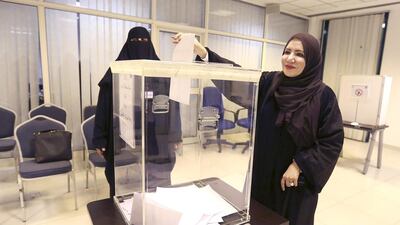RIYADH // Thousands of Saudi women voted for the first time on Saturday in a landmark election that also saw female candidates.
Nearly 6,000 men and about 980 women were running as candidates for local municipal council seats. More than 130,000 women registered to vote compared with 1.35 million men.
There are at least 5 million eligible voters out of a population of 20 million, according to Saudi Arabia’s general election commission.
The municipal election, which does not have quotas for females, is widely seen as an incremental but significant opening for women to play a more equal role in Saudi society.
“Now women have a voice,” said Awatef Marzooq after casting her ballot at a school in the capital. “I cried. This is something that we only used to see on television taking place in other countries.”
Candidate Latifa Al Bazei, 53, a public school principal, said her participation in the race felt like a continuation of her service to the community. She wants to see Saudi Arabia’s majority youth population get more involved in local communities.
“I’ve served 23 years as a teacher and school administrator ... My goal is development, change and innovation,” she said at a Riyadh polling station after casting her vote.
At the King Salman Social Centre in Riyadh, Shara Al Qahtani, a 50-year-old mother of eight, voted for a male candidate whose name she said she recognised. Her two daughters said they voted for female candidates.
Ms Al Qahtani said women being allowed to vote “is good for people and good for society ... Women are partners of men.”
Despite enthusiasm for the race among some, not many women are expected to win seats because of the sheer number of male candidates and because many had no previous experience running campaigns. Many women said they also could not afford the high cost of running a highly visible campaign.
“I don’t consider winning to be the ultimate goal ... but it is the right of being a citizen that I concentrate on and I consider this a turning point,” said Hatoon Al Fassi, general coordinator for the grassroots Saudi Baladi Initiative that worked closely with women to raise voter awareness and increase female participation in the election.
“We are looking at it as an opportunity to exercise our right and to push for more,” she said.
Female candidates will also contend with a deep societal belief among many Saudi voters that women do not belong in public life. Abdullah Al Maiteb made his way into a polling station in Riyadh Saturday morning, expressing a widely held sentiment about why women should not be on the ballot.
“Her role is not in such places. Her role is at home managing the house and raising a new generation,” he said. “If we allow her out of the house to do such business, who is going to take care of my sons?”
In line with Saudi Arabia’s strict gender segregation rules, men and women cast ballots at separate polling stations. Female candidates could also not directly address male voters, and had to either present their platforms from behind a partition, relying on projectors and microphones, or through male supporters and relatives presenting for them.
Municipal councils are the only government body in which Saudi citizens can elect their representatives. It is the third time in recent decades that Saudi men have been allowed to vote. The first local council election since the 1960s was held in 2005 and the second in 2011, with only men taking part.
Both male and female candidates relied heavily on social media to reach voters, using Twitter, Facebook and YouTube to announce campaign events and explain their platforms, which include ideas such as creating more youth centres, nurseries and parks and improving roads.
The candidates are vying for about 2,100 council seats, with another 1,050 seats appointed with approval from the king.
While the municipal councils do not have legislative powers, they do oversee a range of community issues, such as budgets for maintaining and improving public facilities. All major decision-making powers rest solely in the hands of King Salman and the all-male cabinet of ministers.
The winning candidates will serve four-year terms that begin on January 1.
* Associated Press with additional reporting from Agence France-Presse

